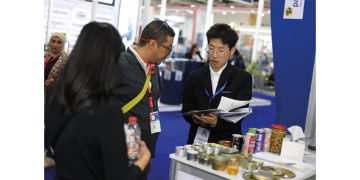Turkish Seafood Promotion Committee was established upon the request from the sector in the leadership of the Ministry of Economics in 2008 and consists of members with the participation of the directors from the Board of Directors of the Aegean, Istanbul and Mediterranean Seafood and Animal Products Exporters’ Association.
The Committee intends increasing exports and consumption, finding new markets and increasing our share in such markets. Secretarial services of the Seafood Products Promotion Committee are implemented by the General Secretariat of the Aegean Exporters’ Associations.
The Sea provides a nutritious and tasty source of food for many creatures as well as being the habitat for a wide range of aquatic life.
Seas Turkey has great potential for seafood production not only from sea-catch but also from the aquaculture of regional Aegean and Mediterranean species along the western and southwestern coastlines. Freshwater farming is also practiced in almost all regions of Turkey. Sea catch accounts for almost 500,000 tons of annual output from Turkish coastlines.
The annual production of aquaculture in 1986 was only 3,000 tons. Today thisproduction figure has exceeded 212,000 tons, the majority of which is exported to more than 75 countries. The capacity for sustainable production, species diversity, EU standard processing and production techniques and proximity to target markets is the essential advantage that generates significant market shares in foreign markets.
Since 2008 there has been a strong trend in the consolidation of large-scale companies with mergers and acquisitions taking place in the Turkish aquaculture sector.
The number of vertically integrated groups operating their own hatcheries, fish feed plants, growing farms, and processing and packaging facilities is increasing year by year. Modern technology is utilized throughout the country at 25 hatcheries and over 300 plants.
More than one thousand kilometers of shoreline along the Aegean and Mediterranean coasts combines a favorable climate and warm sea that generates the unique habitat for the prized European sea bass and Gilthead sea bream. Aquaculture production of other Mediterranean species like Common Sea Bream, Sheep head sea bream, Common Dentex, Meagre, Brown Meagre, White grouper, Shi drum, White Sea bream, Redbanded sea bream is also implemented in Turkey. As an essence of Japanese Cuisine, blue fin tuna is an important product in Turkish seafood exports.
The Turkish aquaculture sector has been rapidly growing with more investments since 1990. The number of inland and sea growing farms has risen to approximately 2000.
The contemporary Turkish seafood sector is giving utmost importance to Hygiene, Quality, Research & Development and the Environment. The R&D for developing the aquaculture of new species is regarded as one of the prospective trends in the industry.
The seafood sector is monitored at all stages. Internationally accredited laboratories check each and every product before they are exported to the markets. Inland fresh water aquaculture farming is also a huge production potential in Turkey. Rainbow trout are brought from Anatolian rivers and lakes that are fed by the crystal clear winter snow of the Anatolian Plateau and the Eastern Highlands. In total 70,000 tons of aquaculture fish is produced in Turkey annually.
Rainbow trout from Turkey is common on the plate of European Cuisines. Smoked trout in particular is highly regarded by Northern European markets. The Turkish seafood industry has achieved significant investments in its processing field which enable the sector to meet modern consumer needs and trends.
Processing facilities are certified by GLOBALGAP, BRC and IFS. Cleaned, filleted, IQF frozen, smoked and marinated aquaculture varieties offer practical, ready to cook and quick to serve recipes that target convenience in our hectic modern life.
In addition to fish, clams, mussels, shrimp, octopus, frog legs, and snails are also popular export items. Diversified promotion activities are implemented in order to increase the national and international demand for seafood consumption, which is considered an essential aspect of healthy nutrition. Domestic and international exhibitions extend the bridge to new markets and facilitate feedback and know how Exchange within the industry. Turkish cuisine is renowned as one of the world’s best. It is considered one of the three major cuisines of the world because of the various recipes, use of natural ingredients, flavors and tastes, which appeal to all palates. Seafood recipes constitute an important part of contemporary Turkish Cuisine. Mediterranean Cuisine, which has become trendy in recent years, has been adopted as an Anatolian lifestyle for thousands of years. The experienced Turkish seafood sector, with its rich aquatic resources, highly experienced hands on human labor force and technical competence strives to be an important player in the worldwide aquaculture industry which has been characterized as the fastest growing food industry in recent years.















